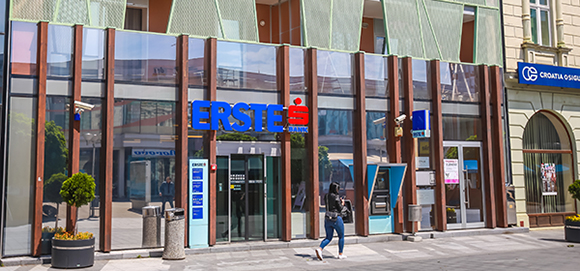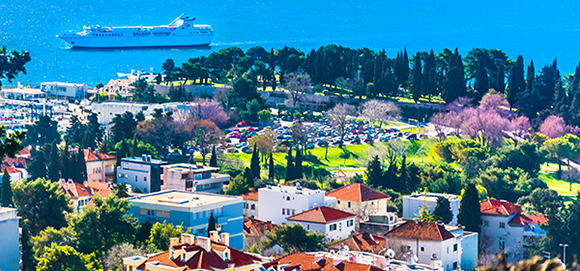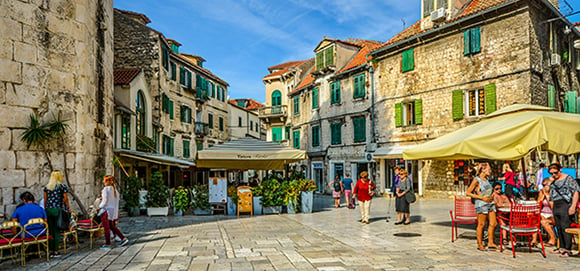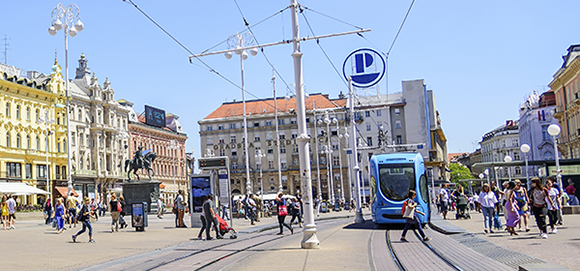10 Tips for Living in Croatia
Summary: Croatia is an astoundingly beautiful country that lies along the Adriatic Sea. Expats discuss why they love living in Croatia, the challenges of expat life there, buying property in Croatia and more. We also cover Croatia's new Digital Nomad Visa.
Expats have explored Croatia in recent years, and expats in Croatia enjoy a gorgeous coastal country on the Adriatic Sea. Tourists from Europe have flocked to Croatia for years, and it has increasingly transformed into a destination for people from all over the world. Croatia is poised to become one of the most popular Digital Nomad destinations with their new Digital Nomad Visa. The visa went into effect in January of 2021 and the application process was introduced several weeks later. Our article, Croatia's Digital Nomad Visa, we provide a step-by-step guide to applying for Croatia's Digital Nomad visa.
- Why Expats Choose to Live in Croatia
- Healthcare in Croatia
- Cost of Living in Croatia
- Visa & Residency
- Real Estate in Croatia
- Expat Life in Croatia
- Learning the Language
- Croatia's Recent History & Economy
- Transportation in Croatia
- Bringing a Car to Croatia
Why Expats Choose to Live in Croatia
"First of all, Croatia is a beauty! The long coastline, from high up near Italy to deep south Albania is one long stretch of magnificent views with hundreds (if not thousands) of islands... Winters are chilly, spring starts early and summer ends late, all of it at the coast under palm trees, oranges and lemons... Life is easy going still, in this catholic country, especially in Dalmatia. If you have seen enough stress, heard enough noise, Croatia is a perfect place to retire, and depending on your needs, life is cheap too," said one expat living in Dubrovnik.
Healthcare in Croatia
"Medical care is well organised with English speaking doctors all around. The big cities have quality hospitals, the smaller towns have at least a first aid. Medical care is below average in price, and cheap compared to the USA," explained one expat. An expat from the EU said, "EU medical card gives access to local medical services. An additional insurance policy provides a top up. Local doctor and medical centre 5km away. Hospital 25km away."
According to the US State Department, "health-care facilities in Croatia, although generally of Western caliber, are under severe budgetary strain. Some medicines are in short supply in public hospitals and clinics. There are numerous private medical and dental practitioners, and private pharmacies stock a variety of medicines not readily available through public health facilities. Tick-borne encephalitis, a disease preventable with a three-shot vaccination series, is found throughout inland Croatia, but is not prevalent along the coast."
 SJB Global
SJB GlobalConnect
SJB-Global is a top-rated financial advisory firm specializing in expat financial advice worldwide, offering retirement planning & tax-efficient solutions with a regressive fee model. Our clients benefit from their country’s most favorable tax environment by utilizing the efficient investment vehicles we offer. Our commitment to quality service is reflected in our stellar reviews, with over 300 testimonials boasting 95% five-star ratings.
Click connect to have our partner contact you via e-mail and/or phone.
 SJB Global
SJB GlobalSJB-Global is a top-rated financial advisory firm specializing in expat financial advice worldwide, offering retirement planning & tax-efficient solutions with a regressive fee model. Our clients benefit from their country’s most favorable tax environment by utilizing the efficient investment vehicles we offer. Our commitment to quality service is reflected in our stellar reviews, with over 300 testimonials boasting 95% five-star ratings.
Connect
Click connect to have our partner contact you via e-mail and/or phone.
Our article, 9 Important Tips about Healthcare for Expats and Global Nomads in Croatia, covers the following:
- Cost of Healthcare in Croatia
- Payment for Health Services
- Health Insurance is Required for Short-Term Visas and Residency
- Quality of Healthcare Facilities in Croatia
- COVID-19 Related Entry Requirements
- Emergency Telephone Numbers in Croatia
- English-Speaking Doctors in Croatia
- Bringing Prescription Drugs into Croatia
- Vaccinations for Croatia
Cost of Living in Croatia

A British Expat in Croatia advised an American Expat that "You can live easily on this amount, not a rich life but life is about quality and this you will find in abundance here, the economy is very poor for croatians here and they earn very little money in comparison to the UK or Germany but that suits me as I live on UK money so its great, the main thing is that the monthly bills are very low here and this makes all the difference, the UK in London cost about $4000 a month to live in an apartment if you're from the UK!!! I voted many years ago with my feet and will not pay tax to a nation that does not look after its own people first, Croatia is full of Croatians and this makes life good, they like the Brits alot so thats another plus, just look outside Zagreb and you will get a deal."
Another expat share: "Yes you can manage easily on $2000 per month with great comfort, but I would not choose centre of Zagreb as there is a premium to be paid and it is better to move outside within 30 minutes properties are so much less money and the communities are better, been here 30 years from UK so know well."
Another expat shared these costs of living: "The electric and gas are really low costs, we pay for 3 houses about 2500 Kuna a month for everything inc telephone, electric, gas, local taxes for rubbish etc, its very low, thats the great thing here the monthly bills are really low and that make living here exceptional."
Cost of Living: Croatia vs. United States
Cost of Living: Croatia vs. United Kingdom
Cost of Living: Croatia vs. Canada
 AGS Worldwide Movers
AGS Worldwide MoversGet Quote
Relocating abroad soon? Make your move with AGS! AGS Worldwide Movers is a leader in the international moving industry. Our experience and expertise allows us to guarantee our clients the best quality moving services.
 AGS Worldwide Movers
AGS Worldwide MoversRelocating abroad soon? Make your move with AGS! AGS Worldwide Movers is a leader in the international moving industry. Our experience and expertise allows us to guarantee our clients the best quality moving services.
Get Quote
Visa & Residency
Croatia's much-anticipated Digital Nomad Visa (aka Temporary Digital Nomad Stay) is here and the application process is finally in place. According to the Croatia's Ministry of Interior, "A DIGITAL NOMAD IS a third-country national who is employed or performs work through communication technology for a company or his own company that is not registered in the Republic of Croatia and does not perform work or provide services to employers in the Republic of Croatia." Temporary stay visas for digital nomads are granted for a period of up to 1 year and it cannot be extended. 6 months after your digital nomad visa expires, you may apply again for another digital nomad visa. In order to be eligible for Croatia's Digital Nomad Visa you must Work Remotely for Own Company or a Company Not Registered in Croatia and does not perform work or provide services to a Croatian employer.
In our article, Croatia's Digital Nomad Visa, we provide a step-by-step guide to applying for Croatia's Digital Nomad visa.
The Digital Nomad visa is one of a number of options for short-term, long-term and permanent residency. Our article, Croatia Visa & Residency, covers these topics:
- Do I Need a Visa for Croatia?
- How Do I Apply for a Visa for Croatia?
- Most Popular Types of Visas for Croatia
- Specific Types of Short, Temporary and Permanent Residency
- Health Insurance is Required for Short-Term and Temporary Stay Visas
- Short-Term Stay in Croatia (90 Days or Less)
- Registering Your Short-Term Stay
- Croatia's Digital Nomad Visa
- Temporary Residence (or Temporary Stay) in Croatia
- Stay and Work Permit (A Type of Temporary Stay Visa)
- Permanent Stay
- COVID-19 Related Entry Requirements
- How do I obtain a Personal Identification Number (OIB)?
Real Estate in Croatia

One expat who visited Croatia wrote: "I just returned from trip to Croatia. First the good news on costs- the average net wage in Croatia is around 1000 euros a month, with which a couple can live a basic comfortable lifestyle. And if one looks at the style and quality of the lifestyle, hard to beat Croatia along the Adriatic.2000 euros net per month-except see below- will be very comfortable in most parts of croatia. On the other hand if are looking to live near the border closer to Italy ( i.e. the Slovenian order) because of the ongoing tourist boom , to find let alone afford rentals is an issue, and crowds in some cities are a pain. The more inland you live, or if you live nearby in Rijeka, the easier and more cost effective it is."
An expat who built a home warned, "we built one [a home], and no, it's not an easy process. Building is a bargain over here, the quality is ok, but the paperwork may kill you. And more important, the registration of ownership in Croatia still is horrible, so TAKE CARE that your dream property does not become a nightmare." Another expat who bought a home said, "[we] purchased property with land. Process not difficult. Find a property you like. Find an independent lawyer, i.e., not the one retained by the real estate company. Exchange a contract stating that subject to the legal process being completed satisfactorily, you agree to buy and pay a refundable deposit. The lawyer needs to make sure the property does not have any liens and the owner(s) actually own what they say and can sell it. That took 9 months. Go to a Notary with the seller and your lawyer and sign in front of the Notary the purchase contract. Immediately after go to the bank and transfer the purchase price, then the property is yours."
Read our article on Best Places to Live in Croatia.
Expat Life in Croatia

An expat in Split, Croatia said, "the expats are mainly German. Few are English speaking. This is a highly seasonal area. The places open in May and close in September. During the tourist season, there is considerable night life, great restaurants, cafes etc. In the winter, it is just locals. The history goes back 3,000 years. Vast number of historic sites, nearby national parks, the Adriatic to swim in and for water sports. You can do as much or as little as you want."
"No need for expat communities, but with a couple of international friends too. Croatia knows many cultural attractions, especially in Zagreb and Split, with tons of festivals, concerts and expositions. Recreation, certainly for active people is all around, and at least half the year the Adriatic offers all options for water lovers," described an expat in Dubrovnik.
SJB Global
SJB-Global is a top-rated financial advisory firm specializing in expat financial advice worldwide, offering retirement planning & tax-efficient solutions with a regressive fee model. Our clients benefit from their country’s most favorable tax environment by utilizing the efficient investment vehicles we offer. Our commitment to quality service is reflected in our stellar reviews, with over 300 testimonials boasting 95% five-star ratings.
SJB Global
SJB-Global is a top-rated financial advisory firm specializing in expat financial advice worldwide, offering retirement planning & tax-efficient solutions with a regressive fee model. Our clients benefit from their country’s most favorable tax environment by utilizing the efficient investment vehicles we offer. Our commitment to quality service is reflected in our stellar reviews, with over 300 testimonials boasting 95% five-star ratings.
Learning the Language
According to Wikipedia, Croatian is the standardized variety if the Serbo-Croatian language spoken in Croatia. "At least try to communicate in its language a bit. However, Croatia, like most modern Western countries, is easy when you speak English, as much of its information is available in English. (And youngsters do understand or speak it too, being modern kids from modern schools)," advised an expat in Croatia.
Croatia's Recent History & Economy
According to the CIA's World Factbook, "although Croatia declared its independence from Yugoslavia in 1991, it took four years of sporadic, but often bitter, fighting before occupying Serb armies were mostly cleared from Croatian lands, along with a majority of Croatia's ethnic Serb population. Under UN supervision, the last Serb-held enclave in eastern Slavonia was returned to Croatia in 1998. The country joined NATO in April 2009 and the EU in July 2013.
Though still one of the wealthiest of the former Yugoslav republics, Croatia's economy suffered badly during the 1991-95 war. The country's output during that time collapsed, and Croatia missed the early waves of investment in Central and Eastern Europe that followed the fall of the Berlin Wall. Between 2000 and 2007, however, Croatia's economic fortunes began to improve with moderate but steady GDP growth between 4% and 6% led by a rebound in tourism and credit-driven consumer spending. Inflation over the same period remained tame and the currency, the kuna, stable. Croatia experienced an abrupt slowdown in the economy in 2008 and has yet to recover; economic growth was stagnant or negative in each year since 2009. Difficult problems still remain, including a stubbornly high unemployment rate, uneven regional development, and a challenging investment climate. Croatia continues to face reduced foreign investment. On 1 July 2013 Croatia joined the EU, following a decade-long application process. Croatia will be a member of the European Exchange Rate Mechanism until it meets the criteria for joining the Economic and Monetary Union and adopts the euro as its currency. EU accession has increased pressure on the government to reduce Croatia’s relatively high public debt, which triggered the EU’s excessive deficit procedure for fiscal consolidation. Zagreb has cut spending since 2012, and the government also raised additional revenues through more stringent tax collection and by raising the Value Added Tax. The government has also sought to accelerate privatization of non-strategic assets, with mixed success."
Croatian Government Site: Visa Application Forms
Transportation in Croatia

Access to public transportation depends upon where you live in Croatia. An expat in Split said, "a car is required. Taxis are costly, but the bus service which is good, only operates between main centres." Another expat in Dubrovnik explained, "public transportation is prominent, railroads just basic, but the highways are excellent. Airports in many places, with a high content of international connections. Driving, flying, ferries, it's all there, and of good quality. One does not need a car, however having one is an advantage."
According to the US Embassy in Zagreb, "an international driver's license is valid only when used in conjunction with a valid license from the U.S. It must be obtained in the U.S., prior to travel. According to Croatian law, U.S. citizens in Croatia for tourism or business may use a U.S. driver's license for up to three months, the same amount of time that U.S. citizens in the country for tourism or business may visit visa-free. U.S. citizens in Croatia with an approved temporary or permanent residence may continue to use a U.S. driver's license for up to twelve months, after which a Croatian driver's license must be obtained. Croatian driver's licenses can be obtained at the local police station where the U.S. citizen is registered for extended or permanent stay. For more information, see http://www.mup.hr/46.aspx."
Bringing a Car to Croatia
Most people recommend against bringing a car to Croatia, suggesting it's better to buy a car once you get there.
A Croatian suggested to expats: "Bringing your car is a year's living costs in Croatia so it does not make sense we have great cars here and I think Better than the cars in the US. better quality german built stuff, though I do like your cars and big power."
An expat from the U.K. wrote: "Its not worth shipping your car - just sell it and buy once here, the transfer costs once here are expensive, unfortunately especially in Croatia as I use my UK cars."
About the Author
 Betsy Burlingame is the Founder and President of Expat Exchange and is one of the Founders of Digital Nomad Exchange. She launched Expat Exchange in 1997 as her Master's thesis project at NYU. Prior to Expat Exchange, Betsy worked at AT&T in International
and Mass Market Marketing. She graduated from Ohio Wesleyan University
with a BA in International Business and German.
Betsy Burlingame is the Founder and President of Expat Exchange and is one of the Founders of Digital Nomad Exchange. She launched Expat Exchange in 1997 as her Master's thesis project at NYU. Prior to Expat Exchange, Betsy worked at AT&T in International
and Mass Market Marketing. She graduated from Ohio Wesleyan University
with a BA in International Business and German.
Some of Betsy's articles include 12 Best Places to Live in Portugal, 7 Best Places to Live in Panama and 12 Things to Know Before Moving to the Dominican Republic. Betsy loves to travel and spend time with her family. Connect with Betsy on LinkedIn.
Additional Information:
- Croatia Guide
- Healthcare & Health Insurance in Croatia
- Members Talk about Healthcare & Health Insurance in Croatia
- Best Places to Live in Croatia
- Real Estate in Croatia
- Guide to Real Estate in Croatia
- Pros & Cons of Living in Croatia
- Cost of Living in Croatia
- 10 Tips for Living in Croatia
- 2025 Guide to Living in Croatia
- Pros and Cons of Living in Croatia 2025





